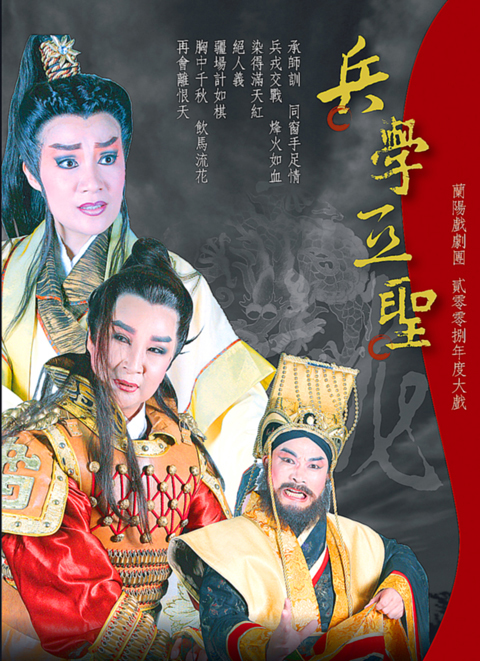Sun Bin (孫臏), a military strategist who lived during China's Warring States Period, decided to live with pigs, eat their food - and even their feces. It was part of a desperate ploy to convince others that he was crazy and therefore no longer a threat to the king of Wei.
But Sun Bin was a threat and the reasons why he evoked such fear in his countrymen are explored in Langyan Opera Troupe's (蘭陽戲劇團) play The Second-Greatest Military Strategist (兵學亞聖), beginning tomorrow night at Taipei City's Zhongshan Hall.
This tale of deceit, directed by popular gezai opera (歌仔戲) actor and impresario Tsao Fu-yung (曹復永), begins with Sun Bin and Pang Juan (龐涓) studying under Sun Tzu (孫子), China's most famous military strategist and author of The Art of War (孫子兵法). Although the two pupils are close friends, Pang Juan envies his classmate's far superior aptitude in military affairs.

PHOTO COURTESY OF LANGYAN OPERA TROUPE
After completing their studies, both students become military advisors to the king of the state of Wei (魏). The king immediately recognizes Sun Bin's strong moral character and remarkable intellect and makes him one of his primary military advisors. But Pang Juan, out of sheer jealousy, hatches a plan to bring disfavor on his friend by telling the king that Sun Bin is conspiring with the state of Qi (齊) against his kingdom. The plan works and the king has Sun Bin stripped of his rank - and kneecaps - and his face tattooed like a common criminal. At the same time, a diplomat from the state of Qi realizes the king's mistake and smuggles Sun Bin out of the kingdom along with Sun Tzu's famous book to serve as military advisor to the king of Qi.
Years later the states of Qi and Wei go to war, and it is on the battlefield that Sun Bin and Pang Juan, military strategists for the two kingdoms, meet again.
The Second-Greatest Military Strategist (兵學亞聖) will be performed at Taipei Zhongshan Hall (台北市中山堂), 98 Yenping S Rd, Taipei City (台北市延平南路98號), tomorrow at 7:30pm and Sunday at 2:30pm. NT$300 to NT$1,000 tickets are available through NTCH ticketing.

In the next few months tough decisions will need to be made by the Taiwan People’s Party (TPP) and their pan-blue allies in the Chinese Nationalist Party (KMT). It will reveal just how real their alliance is with actual power at stake. Party founder Ko Wen-je (柯文哲) faced these tough questions, which we explored in part one of this series, “Ko Wen-je, the KMT’s prickly ally,” (Aug. 16, page 12). Ko was open to cooperation, but on his terms. He openly fretted about being “swallowed up” by the KMT, and was keenly aware of the experience of the People’s First Party

Aug. 25 to Aug. 31 Although Mr. Lin (林) had been married to his Japanese wife for a decade, their union was never legally recognized — and even their daughter was officially deemed illegitimate. During the first half of Japanese rule in Taiwan, only marriages between Japanese men and Taiwanese women were valid, unless the Taiwanese husband formally joined a Japanese household. In 1920, Lin took his frustrations directly to the Ministry of Home Affairs: “Since Japan took possession of Taiwan, we have obeyed the government’s directives and committed ourselves to breaking old Qing-era customs. Yet ... our marriages remain unrecognized,

Not long into Mistress Dispeller, a quietly jaw-dropping new documentary from director Elizabeth Lo, the film’s eponymous character lays out her thesis for ridding marriages of troublesome extra lovers. “When someone becomes a mistress,” she says, “it’s because they feel they don’t deserve complete love. She’s the one who needs our help the most.” Wang Zhenxi, a mistress dispeller based in north-central China’s Henan province, is one of a growing number of self-styled professionals who earn a living by intervening in people’s marriages — to “dispel” them of intruders. “I was looking for a love story set in China,” says Lo,

Standing on top of a small mountain, Kim Seung-ho gazes out over an expanse of paddy fields glowing in their autumn gold, the ripening grains swaying gently in the wind. In the distance, North Korea stretches beyond the horizon. “It’s so peaceful,” says the director of the DMZ Ecology Research Institute. “Over there, it used to be an artillery range, but since they stopped firing, the nature has become so beautiful.” The land before him is the demilitarized zone, or DMZ, a strip of land that runs across the Korean peninsula, dividing North and South Korea roughly along the 38th parallel north. This